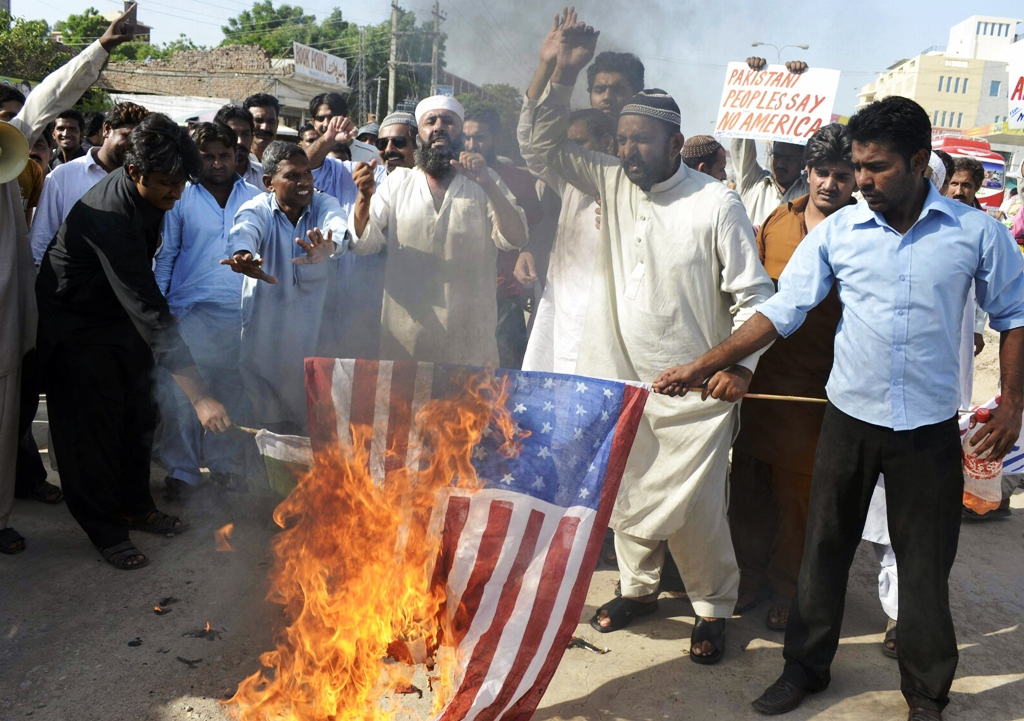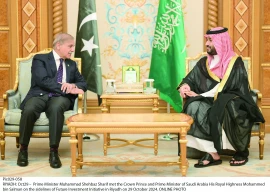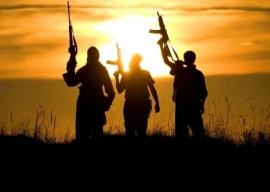
Most mainstream political and religious parties have called for redefining the nation’s foreign policy in their manifestos. At the same time, these parties have also attempted to capitalise on anti-America sentiments to enhance their vote banks.
And yet, despite the rhetoric, no party has delivered a comprehensive strategy or plan of action, particularly for Afghanistan – the immediate challenge that the new government will face as US-led forces withdraw troops.
Historically, successive civilian administrations in Pakistan have had little say on issues of national security and foreign policy, as the country’s powerful military establishment has taken on the role of the final arbitrator. Clearly, the new rulers will have to fight tooth and nail to bring about radical changes, protect the nation’s interests and, at the same time, not irk world powers.
JUI-F
For the forthcoming polls, the main religious parties – Jamiat-e-Ulema Islam (Fazl) and Jamaat-e-Islami – are, once again, relying mainly on anti-US sentiments to make inroads.
Both parties, a part of a religious alliance during the 2002 elections, have promised to pull the country out of the war on terror, if voted into power. They have also reaffirmed their commitment to support the ‘freedom struggle’ in Jammu and Kashmir.
PML-N
Although the Pakistan Muslim League-Nawaz has sought a ‘thorough and comprehensive review’ of national security, its manifesto only mentions pressing foreign policy issues in a generic sense.
The PML-N manifesto says it will pursue a policy of normalisation with countries that have differences with Pakistan, but it is vague about the level of cooperation with the US in the ‘war on terror’. Similarly, no insight is provided into the party’s proposed policy towards Afghanistan’s endgame.
Jarringly, the PML-N is the only party whose manifesto is silent on the controversial drone program in the tribal belt.
On this Kashmir issue, the party reiterates the stance taken by many others: that it will seek a solution to the long standing problem under the UN resolutions and the 1999 Lahore Accord signed between then premier Nawaz Sharif and his Indian counterpart, Atal Behari Vajpayee.
PPP
The Pakistan Peoples Party (PPP) manifesto is the most comprehensive of all. In sharp contrast to the PML-N, the party has adopted a definite stance on the use of unmanned drones in the tribal belt. Although it defends Pakistan’s alliance with the US, it clearly describes all external and unilateral attacks on Pakistani territory to be attacks on the “nation’s sovereignty and a clear violation of international law”.
However, analysts argue that it was during PPP’s five-year tenure that the CIA accelerated its drone programme. After diplomatic cables were leaked, the government was accused of blatantly condoning the strikes.
The PPP also takes a different view on the Kashmir dispute. “Without prejudice to UN Security Council Resolutions, we support open and safe borders at the Line of Control to socially unite the Kashmiri people. We note that India and China have a border dispute and yet enjoy tension-free relations,” the PPP manifesto states.
Like others, the PPP manifesto also seems to capitalise on growing anti-America sentiments.
PTI
Imran Khan’s rise in popularity is widely attributed to his staunch opposition to the war on terror and drone strikes. And yet, the Pakistan Tehreek-e-Insaf (PTI) manifesto does not outline any tangible policy changes, even as it stresses upon the need for a new foreign policy approach. It simply reiterates the party’s well-known stance on drones.
PTI also backs rapprochement with India by suggesting that “detente with India will benefit both countries if centered on conflict resolution and cooperation especially in the field of energy.”
Published in The Express Tribune, April 30th, 2013.
COMMENTS (4)
Comments are moderated and generally will be posted if they are on-topic and not abusive.
For more information, please see our Comments FAQ
1719660634-1/BeFunky-collage-nicole-(1)1719660634-1-405x300.webp)

1732276540-0/kim-(10)1732276540-0-165x106.webp)

1732274008-0/Ariana-Grande-and-Kristin-Chenoweth-(1)1732274008-0-165x106.webp)


1724249382-0/Untitled-(640-x-480-px)1724249382-0-270x192.webp)


1732270499-0/Express-Tribune-(7)1732270499-0-270x192.webp)






Err is this a good time to ask for a peek at the Abbottabad Commission report? It will be two years in two days.
This is extremely partial reporting against PTI, the only party who have always vowed and planned to hold the interest of Pakistan's sovereignity and dignity foremost, a party that have always raised voice agaisnt US attrocities in Tribal Areas. Please do not equate PTI with others in this regard. What for example is Nawaz's stance on drones, suicide bombing and war on terror? Nawaz himself does not know it. While PTI stance is not known only to this reporter.
Historically, successive civilian administrations in Pakistan have had little say on issues of national security and foreign policy, . Worth repeating. It's the elephant in the room that most Pakistani's seem blind to - if you don't control foreign policy then you have little to say over Afghanistan, India, USA etc evidenced by the American's not inviting the civilian govt to attend a key meeting between USA, Afghanistan and Pakistan. . Bashing America is popular in Pakistan - much of the anti American blather promoted by your leaders to garner popularity. Your next leaders will face a new reality - your leverage on the American's will be significantly less while your economic dependence will be at a record high. I suspect the days of taking money without even saying "thank you" are coming to an end - something your leaders need to share with the public.